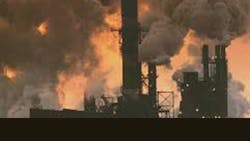Carbon Dioxide in Atmosphere Hits Historic High
WASHINGTON -- The level of carbon dioxide in the atmosphere has broken above 400 parts per million for the first time in human history, U.S .monitors announced Friday, indicating a record level for greenhouse gases.
Climate scientists say that the symbolic threshold should serve as a call for action to begin reversing the damage caused to the environment by human activities and heavy use of polluting fossil fuels.
The Earth has not seen these levels of CO2 in millions of years, long before humans existed, said Bob Ward, policy and communications director at the Grantham Research Institute on Climate Change and the Environment at London School of Economics and Political Science.
"We are creating a prehistoric climate in which human societies will face huge and potentially catastrophic risks," said Ward.
"Only by urgently reducing global emissions will we be able to bring carbon dioxide levels down and avoid the full consequences of turning back the climate clock."
Data showing that the daily average CO2 over the Pacific Ocean was 400.03 ppm as of May 9 was posted online by the National Oceanic and Atmospheric Administration's monitoring center in Mauna Loa, Hawaii.
A separate monitor at the Scripps Institution of Oceanography in San Diego, California initially reported its May 9 data showing that atmospheric carbon dioxide was at 399.73 ppm, but later revised that to show 400.08 ppm.
The difference came down to time zone, with NOAA using the universal time clock and Scripps reporting on Hawaii time. When Scripps adjusted its measurements to UTC time, it concurred with NOAA that 400 ppm threshold had been breached.
Michael Mann, director of the Earth System Science Center at Penn State, said the main concern is the speed with which the concentrations of CO2 are rising.
"There is no precedent in Earth's history for such an abrupt increase in greenhouse gas concentrations," said Mann, who has authored two books on climate change.
"While living things can adapt to slow changes that took place over tens of millions of years, there is no reason to believe that they -- and we -- can adapt to changes that are a million years faster than the natural background rates of change."
Mann said the last time scientists are confident that CO2 was sustained at the current levels was more than 10 million years ago, during the middle of the Miocene Period.
Back then, global temperatures were hotter, ice was sparse and sea level was dozens of meters higher than it is today.
"It took nature hundreds of millions of years to change CO2 concentrations through natural processes such as natural carbon burial and volcanic outgassing," Mann said.
"What we are doing is unburying it. But not over 100 million years. We're unburying it and burning it over a timescale of 100 years, a million times faster."
-Kerry Sheridanm, AFP
Copyright Agence France-Presse, 2013
About the Author
Agence France-Presse
Copyright Agence France-Presse, 2002-2025. AFP text, photos, graphics and logos shall not be reproduced, published, broadcast, rewritten for broadcast or publication or redistributed directly or indirectly in any medium. AFP shall not be held liable for any delays, inaccuracies, errors or omissions in any AFP content, or for any actions taken in consequence.
